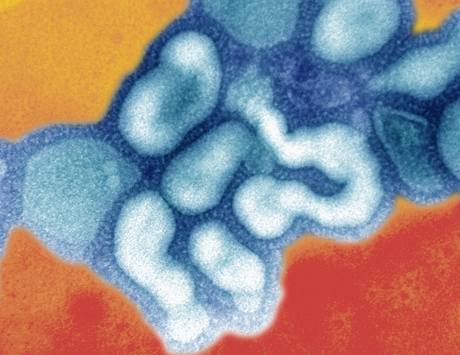The World Health Organization (WHO) raised its pandemic alert level to Phase 5 on a 6 point scale.
 |
|
|  |
|
|
| The media reports are twisted. Realities are turned up side down. Policy statements are not backed by medical and scientific evidence. |
|
|
The WHO’s Phase 5 alert means "there is sustained human-to-human spread in at least two countries and that global outbreak of the disease is imminent… It also signals an increased effort to produce a vaccine… Human cases have been confirmed in Mexico, the United States, Canada, Britain, Israel, New Zealand and Spain." (emphasis added)
According to reports, the WHO took this decision after " a 23-month-old [child] died [from the swine flu] in Texas after travelling there from Mexico for medical treatment."
The swine flu was, according to reports, confirmed in 11 states in the US. Health officials at the WHO in Geneva and Washington are quoted as saying that the "spread of the virus is unlikely to stop".
The media has gone into full gear with little analysis and review of the evidence, focussing their attention on the more than 2400 cases of non-specific influenza in Mexico.
"the global outbreak is imminent…
all countries should activate preparedness plans",
The worst health crisis facing the world in 90 years…"
On the day following the WHO’s Phase 5 Pandemic Alert, a scientist attached to the European Union’s Centre for Disease Control and Prevention hinted, without evidence, that the epidemic could potentially affect 40% to 50% of the EU population "in a mild way". (See europeanvoice.com, April 30, 2009).
Professor Neil Ferguson, a member of the World Health Organisation task force on swine flu, stated that "40 per cent of people in the UK could be infected within the next six months if the country was hit by a pandemic."
“We don’t really know what size epidemic we will get over the next couple of months… It is almost certain that, even if it does fade away in the next few weeks – which it might – we will get a seasonal epidemic in the autumn."
“We might expect up to 30 to 40 per cent of the population to become ill in the next six months if this truly turns into a pandemic. “We could get substantial numbers infected in the next few weeks but, if I was to be a betting man, I would say it would be slightly longer because we are moving into summer.” Prof. Ferguson said the 152 deaths in Mexico probably made up a relatively small proportion of the total number infected, which might run into tens or hundreds of thousands." (Daily Express, May 1, 2009)
The media reports are twisted. Realities are turned up side down. Policy statements are not backed by medical and scientific evidence. Professor Ferguson’s statements are unfounded. He has not bothered to check the number of "laboratory confirmed" swine flu cases in Mexico.
30 to 40 % of the British population? Up to 50 % of the population of the European Union’s 500 million population?
On what basis are these statements being made?
On April 27, there was, according to reports, only one case of swine flu in the entire European Union: "Europe’s first confirmed case of swine flu has been diagnosed in Spain. The country’s health ministry confirmed the news on Monday morning, after tests on a man who had recently returned from a trip to Mexico." (BBC, April 27, 2009)
Weakening the Social Protest Movement
Statements of this nature on the "inevitable spread" of the disease, create, quite deliberately, an atmosphere of fear, insecurity and panic. They also serve to distract people’s attention from a devastating global economic crisis which is leading the World into mass poverty and unemployment, not to mention the war in the Middle East and the broader issue of US-NATO war crimes.
The Real Global Crisis is marked by poverty, economic collapse, ethnic strife, death and destruction, the derogation of civil rights and the demise of State social programs. The EU announcement of the swine flu pandemic inevitably serves to weaken the social protest movement which has spread across Europe.
In Mexico, the swine flu emergency measures which have "closed down" entire urban areas, are widely perceived as a pretext of the Felipe Calderon government to curb mounting social dissent against one of the most corrupt administrations in Mexican history.
In Mexico, the May 1st Parade, which was directed against the Calderon government, was cancelled.
The WHO’s Balance Sheet
The WHO advisory points to 148 laboratory confirmed cases Worldwide of the swine influenza, including 8 deaths, barely a pandemia:
"29 April 2009 — The situation continues to evolve rapidly. As of 18:00 GMT, 29 April 2009, nine countries have officially reported 148 cases of swine influenza A/H1N1 infection. The United States Government has reported 91 laboratory confirmed human cases, with one death. Mexico has reported 26 confirmed human cases of infection including seven deaths.
The following countries have reported laboratory confirmed cases with no deaths - Austria (1), Canada (13), Germany (3), Israel (2), New Zealand (3), Spain (4) and the United Kingdom (5).
Further information on the situation will be available on the WHO website on a regular basis." (WHO.org)
In a 29 April statement, the WHO Director-General, Dr Margaret Chan confirmed that
"Based on assessment of all available information, and following several expert consultations, I have decided to raise the current level of influenza pandemic alert from phase 4 to phase 5.
Influenza pandemics must be taken seriously precisely because of their capacity to spread rapidly to every country in the world.
… WHO will be tracking the pandemic at the epidemiological, clinical, and virological levels.
… I have reached out to donor countries, to UNITAID, to the GAVI Alliance, the World Bank and others to mobilize resources.
Bonanza for the Pharmaceutical Conglomerates
Big Pharma has been identified by the WHO as the solution to the crisis:
"I [the WHO Director-General] have reached out to companies manufacturing antiviral drugs to assess capacity and all options for ramping up production. I have also reached out to influenza vaccine manufacturers that can contribute to the production of a pandemic vaccine."
The swine flu pandemic constitutes a corporate bonanza for a handful of BioTech conglomerates. The European Union has already given the green light to work with Big Pharma to develop a vaccine against the swine flu.
Examination of the Evidence
The data used to justify a Worldwide level 5 alert is extremely scanty. The WHO not only asserts that a "global outbreak of the disease is imminent", it also distorts Mexico’s mortality data pertaining to the swine flu pandemic. According to the WHO Director General Dr. Margaret Chan in her official April 29 statement: "So far, 176 people have been killed in Mexico". From what? Where does she get these numbers? 159 died from influenza out of which only seven deaths corroborated by lab analysis, resulted from the H1N1 swine flu strain, according to the Mexican Ministry of Health. (For details, see below).
As documented by William Engdahl, the symptoms of swine flu are non specific, similar to those of flu in general. (See William Engdahl, Global Research, April 29, 2009).
Scientific opinion contradicts the WHO official statement:
"Scientists studying the virus are coming to the consensus that this hybrid strain of influenza — at least in its current form — isn’t shaping up to be as fatal as the strains that caused some previous pandemics.
In fact, the current outbreak of the H1N1 virus, which emerged in San Diego and southern Mexico late last month, may not even do as much damage as the run-of-the-mill flu outbreaks that occur each winter without much fanfare.
Mounting preliminary evidence from genetics labs, epidemiology models and simple mathematics suggests that the worst-case scenarios are likely to be avoided in the current outbreak." (Los Angeles Times, April 30, 2009)
Mexico
Influenza is a common disease. There are millions of cases of influenza across America, on an annual basis. "According to the Canadian Medical Association Journal, the flu kills up to 2,500 Canadians and about 36,000 Americans annually. Worldwide, the number of deaths attributed to the flu each year is between 250,000 and 500,000" (Thomas Walkom, The Toronto Star, May 1, 2009)
Most of the reported influenza cases in Mexico do not exhibit the A/H1N1 strain.
From the press reports, most of the Mexican cases of swine flu were "suspected": they have not been confirmed by an advanced lab examination. The Mexican Minister of Health, José Ángel Córdova confirmed that there were "2498 serious cases of atypical pneumonia associated with a flu condition" …[which] could be related to the A/H1N1 virus". Out of those 2498 cases of influenza, 159 died, of influenza or related ailments, but only seven of these deaths were related to the swine flu, according to the official statement of the Minister of Health.
The figures above are consistent with the overall pattern of influenza observed in Mexico in previous years. "In a normal year, between 6,500 and 7,500 Mexicans die from pneumonia-like diseases" (Ibid)
159 reported deaths "have been blamed on the outbreak" but the lab reports suggest that the swine flu was the cause of death only in seven out of 159 cases.
For instance, in the Veracruz town of La Gloria where there was an outbreak of acute respiratory infections, out of 450 cases, 35 were tested for the swine flu virus and only one came back positive. (That is a ratio of 1/450)
The press reports are invariably biased. They will quote 152 or 159 deaths from the H1N1 virus, when in fact only seven of these deaths are associated with the A/H1N1 swine flue strain, according to the Minister of Health. The other deaths may be associated with cases of ordinary flu and/or related conditions, but it seems that the reports rarely make the distinction. Moreover, no details were given as to the lab results pertaining to these seven cases.
In the US only one lab in the entire country has the ability to confirm the identify of the virus, namely the Centers for Disease Control and Prevention located in Atlanta. How many labs are there in Mexico which have the ability to confirm the identify of the virus?
According to reports, samples are being sent to Mexico’s National Institute of Epidemiological Diagnosis and Reference, which then forwards them to government labs in the US and Canada. What this suggests is that there is no lab based analysis which documents the relatively large number of suspected cases. According to the Minister’s statements, the laboratory analysis pertaining to the 159 deaths is being conducted in Mexican labs with the support of the Atlanta based CDCP and that the results are forthcoming.
The US
In the US there have been 109 reported cases of the virus (April 30, 2009), of which only five were hospitalized. The U.S. Centers for Disease Control confirmed that a 23 month child in Texas had died from the swine flu virus, following hospitalisation and clinical examination.
U.S. Human Cases of Swine Flu Infection
(As of April 30, 2009, 10:30 AM ET)
| States | # of laboratory confirmed cases | Deaths |
| Arizona | 1 | |
| California | 14 | |
| Indiana | 1 | |
| Kansas | 2 | |
| Massachusetts | 2 | |
| Michigan | 1 | |
| Nevada | 1 | |
| New York | 50 | |
| Ohio | 1 | |
| South Carolina | 10 | |
| Texas | 26 | 1 |
| TOTAL COUNTS | 109 cases | 1 death |
International Human Cases of Swine Flu Infection
See: World Health Organization |
Media Disinformation
News reports point to "hundreds of New York schoolchildren reported to have fallen sick with "suspected swine flu". There was, however, no evidence corroborated by lab examinations of the incidence of the swine flu H1N1 strain. In all likelihood, the children were suffering from the flu, which is part of a common occurrence during the month of April. "All the cases were mild, no child was hospitalized, no child was seriously ill,” Dr. Frieden said. Health officials reached their preliminary conclusion after conducting viral tests on nose or throat swabs from the eight students, which allowed them to eliminate other strains of flu."
Tests were conducted on school children in Queen’s, but the tests were inconclusive: among theses "hundreds of school children", there were no reports of laboratory analysis leading to a positive identification of the influenza virus. In fact the reports are contradictory: according to the reports, the Atlanta based CDCP is the "only lab in the country that can positively confirm the new swine flu strain — which has been identified as H1N1." (NYT, April 25, 2009)
Influenza is a common disease. Unless there is a thorough lab examination, the identity if the virus cannot be established.
It is revealing that the Atlanta based CDCP is playing a key role in identifying the virus on behalf of several Latin American countries, including Mexico, Guatemala, El Salvador and Costa Rica. On April 30th, the US government established a CDCP lab in Mexico. In other words, a US government agency is monopolising the conduct of laboratory testing, the data and analysis.
 foto: Profimedia.cz
foto: Profimedia.cz




 Před dvěma měsíci proběhla českým tiskem
Před dvěma měsíci proběhla českým tiskem  Existují však ještě smělejší výklady možné snahy o rozšíření chřipkové pandemie. Žijí mezi (či spíše nad) námi politicky vlivní environmentalisté, kteří nepřestávají, navzdory faktům, svědčících o opaku, varovat před hrozbou údajného přelidnění. Známý oceánolog Jacques Cousteau se v roce 1991
Existují však ještě smělejší výklady možné snahy o rozšíření chřipkové pandemie. Žijí mezi (či spíše nad) námi politicky vlivní environmentalisté, kteří nepřestávají, navzdory faktům, svědčících o opaku, varovat před hrozbou údajného přelidnění. Známý oceánolog Jacques Cousteau se v roce 1991  Ten samý postoj k řešení „populační otázky a ekologické rovnováhy“ zaujímá známý ekolog Eric Pianka, jenž v roce 2006 obdržel cenu Vědec roku, každoročně udílenou Texaskou akademií věd. Ve své bouřlivě aplaudované přednášce zcela vážně konstatoval, že pro udržení ekologické rovnováhy by bylo zapotřebí odstranit 90% lidí z povrchu zemského, o což by se mohl postarat smrt rozsévající virus Ebola...
Ten samý postoj k řešení „populační otázky a ekologické rovnováhy“ zaujímá známý ekolog Eric Pianka, jenž v roce 2006 obdržel cenu Vědec roku, každoročně udílenou Texaskou akademií věd. Ve své bouřlivě aplaudované přednášce zcela vážně konstatoval, že pro udržení ekologické rovnováhy by bylo zapotřebí odstranit 90% lidí z povrchu zemského, o což by se mohl postarat smrt rozsévající virus Ebola...